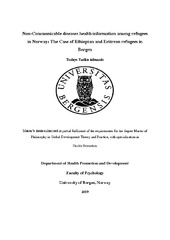| dc.description.abstract | Background: Ethiopian and Eritrean refugees are entitled to the same health care access as Norwegian citizens in Norway. NCDs are recognised as public health issues in Norway, but NCD health information is non-existent in the languages of groups of refugees. Research objective: This study explores refugee-focused NCD health information materials and services accessed by Ethiopian and Eritrean immigrants living in Bergen. Moreover, this study tries to discover the understanding, perceptions, and experiences of these refugees regarding their health issues in general and experiences with NCDs. Research methods: This study used qualitative phenomenological design to explore the situation of refugee-focused NCD health information and the understanding, perceptions, and experiences of these refugees regarding health and NCDs. The methods for data collection were focus group discussion (FGDs), in-depth interviews (IDIs), and document analysis. The two focus group discussions conducted consisted of a group of females and a group of males, with six participants in each with age ranges between 40 and 50. Two participants, one from each FGD group, with personal experience of cancer and diabetes were selected for individual narrative interviews. Purposive sampling was applied in recruiting participants. The data was coded by using “Nvivo software Version12” and analysed using thematic network analysis. Integral Theory was employed for the theoretical framework in this study. Findings: This study found that the health information materials on NCDs are not immigrant-focused, the information materials do not consider elements such as language, level of education, or the age of the participants. As a result, they are less likely to take up health services such as screening for cervical cancer. Although NCD health information is found to be lacking among the research participants, health institutions are providing NCD health services to some of the participants. The participants of this study reported that they feel inhibited from discussing the issue of NCDs and consider talking about NCDs a taboo inside their communities. They also tend to hide their NCD status if they are aware of it. Before their arrival in Norway, they used to have different perceptions about NCDs; for example, considering NCDs as a disease that occurs only among the rich; but as a result of the information they got informally from their social networks, they said that they ‘no longer consider NCDs as the disease of the rich only’. Norwegian health authorities provide information about NCDs in Norwegian only, for example awareness creation materials and letters inviting people to free screening for cervical cancer are written in Norwegian. These offers are seldom taken up by Ethiopian and Eritrean refugees because of language difficulties, experience of fear and cultural silence. Consequently, NCDs may pose an unidentified health risk to this group in the population. | en_US |
